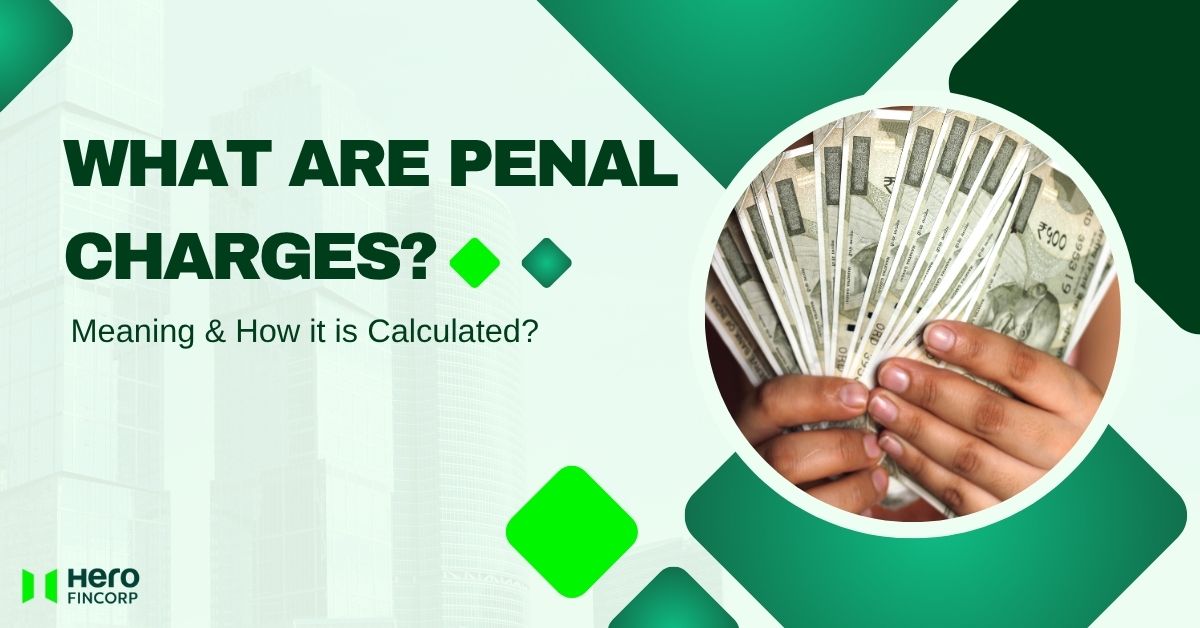What are Penal Charges - Meaning & How it is Calculated?

They’re often used interchangeably, but technically, late payment charges are a type of penal charge applied when you delay your EMI. Penal charges, however, can also include other breaches like loan cancellation or foreclosure.
Now, Shania wonders, "What are the penal charges?" Simply put, it’s a fee lenders impose when payments are delayed or certain terms are broken. But how exactly does it work? And can it be avoided? Let’s find out.
What Are Penal Charges?
Penal charges are extra fees that banks and financial institutions charge when you don’t follow the agreed repayment terms of your loan. Think of them as a form of discipline. They aren’t to punish you, but to ensure you stick to timelines and loan conditions. You’ll find the penal charges clearly mentioned in your loan agreement and vary depending on the nature of the default.
All About Penal Charges: What are the Different Types?
Below are some common types of penal charges, their meaning, and how Hero FinCorp applies them:
| Type of Penal Charge | What It Means | Hero FinCorp Rate/Policy |
| EMI Bounce Charge | Applied when your EMI payment fails due to insufficient balance or any other reason | ₹350 per instance |
| Foreclosure Charge | If you decide to close the entire loan before the end of its tenure | 5% of the outstanding principal + GST |
| Prepayment Charge | When you pay off a part of your loan before the due date | Not applicable |
| Interest on Overdue EMIs | Interest applied on the overdue amount for every month the EMI remains unpaid | 1–2% of the overdue EMI per month |
| Cheque Bounce Penalty | A fixed penalty, when a cheque payment fails to clear | Fixed nominal penalty |
| Loan Cancellation Charge | If you cancel a loan after disbursement | No cancellation charge via the online app. However, interest and processing fees are non-refundable |
How are Penal Charges Calculated?
Now that you understand the meaning of penal charges, let’s revisit Shania’s story.
Here’s the situation:
• Principal: ₹2,00,000 (personal loan)
• Interest rate: 19% p.a.
• Tenure: 24 months
• Monthly EMI: ≈ ₹10,081.72
• Penal (overdue) charge: typically 1%–2% per month on the overdue amount
• Delay: 8 days
How We Calculate the Penalty
• Convert the monthly penalty rate to a daily rate: monthly% % ÷ 30.
• Penal charge = EMI × daily_penalty_rate × days_overdue.
(That’s because penal interest is usually applied on the overdue amount for each day it remains unpaid.)
Crunching the Numbers for the 8-Day Delay
1. Daily rate at 1%/month = 1% ÷ 30 ≈ 0.03333% per day
• Penalty = 10,081.72 × 0.0003333 × 8 ≈ ₹26.88
• Total payable = 10,081.72 + 26.88 ≈ ₹10,108.60
2. Daily rate at 2%/month = 2% ÷ 30 ≈ 0.06667% per day
• Penalty = 10,081.72 × 0.0006667 × 8 ≈ ₹53.77
• Total payable = 10,081.72 + 53.77 ≈ ₹10,135.49
The Key Takeaway
An 8-day delay adds roughly ₹27–₹54 to the EMI in this example.
How to Avoid Penal Charges?
A little carefulness and planning can help you avoid additional charges. Here are some personal finance tips to keep these at bay:
• Mark EMI dates in your calendar or phone, or set reminders.
• Set up auto-debits and link your loan and savings accounts.
• Maintain some buffer amount in your account to avoid cheque or auto-debit bounces.
• Inform your lender proactively in case of any delays. Some may offer short grace periods or solutions.
• Use digital apps. Platforms like Hero FinCorp’s loan app make it easy to view due dates, pay EMIs instantly, and avoid penalties.
Staying on Track Pays Off
Missing an EMI might seem like a small slip, but the charges and their long-term impact can add up. Penal charges are simply a lender’s way of ensuring financial discipline. Staying punctual serves two benefits: you save money and you build creditworthiness for future loans.
Want to stay on top of your loans? Download the Hero FinCorp Personal Loan App for end-to-end loan management!
Frequently Asked Questions
1. Is there a law protecting borrowers from unfair penal charges?
Yes! The RBI mandates that penal charges must be clearly disclosed upfront in the loan agreement. The penal charges can’t be hidden or excessive. This ensures that borrowers are treated fairly.
2. Can penal charges be waived or withdrawn?
In some cases, yes. The lender may waive or withdraw penal charges if it’s your first delay or when you have a good repayment record. But it’s purely at their discretion.
3. What’s the difference between penal charges and late payment charges?
They’re often used interchangeably, but technically, late payment charges are a type of penal charge applied when you delay your EMI. Penal charges, however, can also include other breaches like loan cancellation or foreclosure.